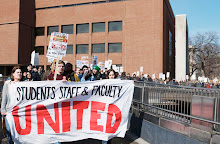On March 12 the President informed faculty that our vote on March 25 only affects faculty salaries. Yet this vote is part of a larger plan that affects the whole University. Numerous faculty have objected to the regressive across-the-board structure of the furloughs and pay cuts. Faculty and deans have also objected to the two per cent compensation pool, which will be paid for with furloughs and lay-offs.
Faculty are privileged in having a strong tenure code that requires the administration to negotiate with us before cutting our pay. We can use this power to encourage the administration to present a different plan that takes into account concerns raised not only by faculty, but also by students and staff. President Bruininks has threatened to make painful cuts to academic units if the faculty do not assent to his proposal, cuts that will inevitably result in layoffs and cuts in instruction. But threats are a poor substitute for negotiation and reason. Alternative cuts can be made that will protect instruction and the lowest-paid employees at the U. Faculty governance means more than rubber-stamping motions brought forward by the administration.
In this spirit, we offer two resolutions. The first resolution, the Resolution on Financial Stringency, calls for the administration to respond to faculty requests for complete information on expenditures, and the relationship of these expenditures to the core mission of the University. In the context of reduced state funding, ever-rising tuition, and demands for employees to take pay cuts, it is time for an open and inclusive conversation about redefining priorities. This conversation cannot take place without budget transparency. (Link to Resolution on Financial Stringency: http://www.docstoc.com/docs/30340464/Resolution-on-Financial-Stringency
The second resolution, the Resolution on Salary Reductions, calls for the administration to use a sliding scale pay cut rather than the proposed across-the-board cuts. Although the Faculty Senate can only approve or reject cuts to faculty salaries (i.e. not for other employees), FRPE hopes that this sliding scale will be extended beyond faculty to apply to all employees at the University. (Link to Resolution on Salary Reductions: http://www.docstoc.com/docs/30420088/Resolution-on-Salary-Reductions
Resolutions are non-binding. FRPE is aware that the Resolution on Financial Stringency would make the Resolution on Salary Reductions unnecessary, at least for the moment. We also realize that some faculty senators will support both resolutions, and some will support one but not the other. (Some may support neither, of course.) Faculty Senators who support either or both of these resolutions should vote "no" on the President's motion OR support a move to table his motion until he is in compliance with the adopted resolution. Vote "yes" on these resolutions and support the pursuit of transparency and equity at the University of Minnesota.
Friday, March 19, 2010
Subscribe to:
Post Comments (Atom)


As you know, the university of Minnesota faculty representative, Professor Martin Sampson, has alerted us to how this situation is being viewed from the State capitol. I've got a post up with the full text of his message:
ReplyDeletehttp://blog.lib.umn.edu/bgleason/pt/2010/03/important_message_from_u_of_m.html
from his message:
Both Democratic and Republican Senators asked pointed questions in regard to whether the faculty "gets it" that huge numbers of people are unemployed, that Minnesota is in a very deep recession, and so forth. The tone of a wide ranging discussion was not friendly. The clear, ardent message is that the U of M faculty voting against a temporary pay cut would be a statement that the faculty does not "get it."
So the faculty are the bad guys? Thanks a lot President Bruininks. In absolute terms this raise (1% or 2%) is peanuts for most faculty - and I say that advisedly because, to our shame, it is not for some of us.
The reason faculty should vote no on the president's resolution is that he has violated the tenure code. If he had done what he is supposed to, I could easily support a salary cut of significantly more - for those who can afford it.
The administration has steadfastly refused requests that their significantly higher than average salaries be cut by amounts from ten to twenty percent.
Once again, through poor leadership, the President has created a public relations nightmare.
ps. If you do not wish to monkey around registering, etc. on the download site, the text of both documents is available at the usual place: The Periodic Table, Too
ReplyDeletehttp://blog.lib.umn.edu/bgleason/pt/